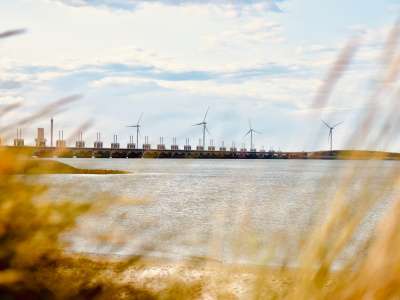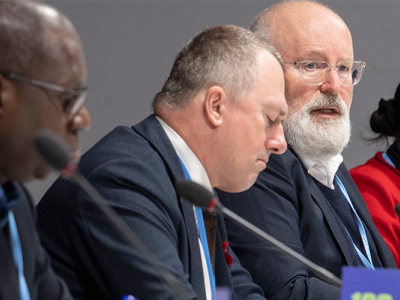
#VallettaSummit Part 2 – The EU’s new Trust Fund for Africa
What's on this page
Looking a gift-horse in the mouth? Valletta was a historic moment - the biggest ever summit hosted by Malta to discuss at the highest-level EU-Africa cooperation on migration as a sole agenda item. The more operational nature of the new Action Plan and Trust Fund may facilitate implementation – but it is clear that the Summit was held under the harsh glare of an almost panicked ‘crisis-response’ mood that did not forge any visionary action on the governance of migration and mobility. This is part two of a two-part blog on ECDPM’s reaction to the EU-Africa Valletta Summit. Part one focused on the Valletta Summit Action Plan As part of the Valletta Summit, the EU signed the constitutive agreement of a new Trust Fund envisaged to partly fund the implementation of the Valletta Action Plan. The Trust Fund for African countries has been set up at record speed, by European standards, and made plenty of headlines. While the Trust Fund aims to deliver concrete results in terms of addressing the root causes of conflict, displacement and irregular migration in a more comprehensive way across the European Union, it was surely also intended as a leverage tool to ensure cooperation of African States in implementing the agreed Action Plan (especially in the context of some EU member states pushing to make aid conditional on readmission cooperation).
See our latest Briefing Note 'EU Trust Funds: Shaping more comprehensive external action?'
[gview file="http://ecdpm.org/wp-content/uploads/Briefing_Note_81_EU_Trust_Funds_Africa_Migration_Knoll_Hauck_Cangas_ECDPM_2015.pdf" width="100%" save="1"] Development cooperation projects, in tandem with support for better governance on migration, will reduce irregular migratory pressures from Africa towards the EU - at least that is the essential logic underlying the Trust Fund. Although support for resilience, decent livelihoods and long-term development are all important in their own right - there is no strong evidence that these factors necessarily reduce migration flows. In the current ‘crisis mood’ the out-dated concept that “more development = less migration” has flared up again. The plan is that the €1.8bn from the EU Commission will be topped up by another €1.8bn from the EU Member States. This is a large pot of money, and brings opportunities for more flexibility in addressing the emerging challenges in the three regions that benefit from the fund. Yet, there are at least three reasons why, in this case, it is wise to have a closer look in the mouth of this ‘gift-horse’. Ownership and direct involvement Not all of the money is new and a very large amount of the cash pledged by the EU Commission is provided through the European Development Fund (EDF) - which was already meant benefit African countries and regions. By using EDF reserve money (about 1bn) the EC unlocks additional funding previously not committed. The Trust Funds allows for more flexibility and applying emergency procedures can finance projects quicker. Yet, with money committed to Regional Indicative Programmes being shifted to the Trust Fund, regional organisations may have in fact less formal oversight over how the money will be spent, as they would under EDF rules. Before, African countries had an official role (through the co-management principle of the Cotonou Partnership Agreement) but under the Trust Fund arrangement they are allowed only ‘observer’ status in the Trust Fund Board. This does not mean that money will not be used for agreed regional strategies – yet, the money may not be channelled through the structures of RECs anymore. Moreover, our conversations with EU and African staff revealed that some Regional Economic Communities (REC’s) have had little margins of manoeuvre to resist the EU’s decision to shift money previously channelled through RECs to the new Trust Fund. Upholding principles Africans voiced their concerns at the Valletta Summit that aid money may be used to implement Europe’s more narrow security agenda abroad. Yet, funds earmarked as aid have to abide by rules and cannot be easily diverted; but additional funding from the EU Member States don’t have to. So while the additional money provided by Member States is still nowhere near the planned €1.8bn it is also not clear whether this money will be used in a balanced way for poverty reduction, long-term development and legal mobility projects. The fact that DG DEVCO is chairing the Trust Fund Board may help to counter pressures to use aid funding for a more narrow European migration agenda and that development principles will be upheld and respected. Yet, the current political climate in Europe pushes the EU to use development, whether from the Trust Fund or outside funding for migration objectives. The Commission’s Vice President Timmermans for example has argued in favour of ‘encouraging non-EU countries to draw up and implement an efficient return policy through the Union’s development aid programmes’ The law of unintended consequences? The additional funding can be very important if it is used wisely - but the expectations are also incredibly high. The EU and its member states provide more than € 20 billion in aid annually to African countries. So will the extra cash - a small portion of what we already give - spread over 23 countries over 5 years period really be the ‘silver-bullet’ in addressing root causes? This is highly questionable. Some African states pointed out that the amount of money is not sufficient and described the fact that Europe raised €3bn for Turkey alone was an insult to Africa. Other African states said that it is not about the money from the EU - remittances trump aid by far and broader and more coherent EU policies in a range of sectors can create more opportunities of significance. EU member states are simultaneously debating and implementing substantive cuts in overseas aid to deal with the refugee crisis at home. The Trust Fund was presented at Valletta where other important ‘beyond aid’ commitments were largely off the table. This is part two of a two-part blog on ECDPM’s reaction to the EU-Africa Valletta Summit. Part one focused on the Valletta Summit Action Plan. The views expressed here are those of the author, and not necessarily ECDPM


